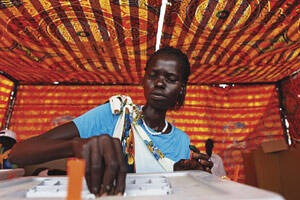The planned referendum on independence for Southern Sudan scheduled for Jan. 9 is simply a “formality,” and efforts must be undertaken to ensure that the fragile peace that exists in Sudan continues after the vote, said members of a Sudanese delegation to the United States. “The people of the South are beating day and night the drum of secession, independence,” said Bishop Paride Taban, retired bishop of Torit.
Bishop Taban, joined by Auxiliary Bishop Daniel Adwok Kur of Khartoum and John Ashworth, acting director of the Denis Hurley Peace Institute in South Africa and an adviser to Catholic Relief Services in Sudan, spoke at the Universtity of Notre Dame on Oct. 5 at a conference sponsored by C.R.S., the U.S. bishops and the Kroc Institute for International Peace Studies, among others. The group said that the need to preserve peace after the referendum is vital to the region’s future.
“Southerners are going to vote overwhelmingly for separation,” Ashworth said. “But the government in Khartoum doesn’t want separation to happen.” The trio warned that a return to civil war would only preserve the power of the Islamic government and allow for the continued oppression of Sudan’s ethnic and religious minorities.
Ashworth said that even if the vote is overwhelmingly in favor of independence, the outcome could be nullified. He explained that a provision under the 2005 Comprehensive Peace Agreement that ended decades of civil war requires that at least 60 percent of registered voters turn out in order for the referendum to be official. “Given the difficulties of a country like Sudan, without communication, without roads, it’s going to be very difficult to get people to vote,” Ashworth said. “There is fear among people that ghost voters will be registered and then not vote.”
The role of the church will be vital to maintaining peace, both bishops said. Bishop Adwok, who chairs the Justice and Peace Commission of the Sudanese bishops’ conference, said the Catholic Church has gained the respect of people of all faiths because of its efforts to provide shelter, food and other basic necessities to war victims. “The church plays a major role, and it plays it in the eyes of the people,” he said. “They look at the church as another government, an alternative government.”
The situation in southern Sudan is complicated by the presence of oil reserves, the lack of specific boundaries marking the south from the north and questions about displaced people from the south who remain in northern territories, the panelists said. Specifically, about 85 percent of Sudan’s oil reserves are located in the south. Revenue-sharing has so far not been discussed. The absence of an agreement would feed the possible renewal of hostilities, Ashworth said. Whether such complex issues can be resolved by Jan. 9 remains questionable, he said.
“What is clear is that southern people want to secede and there’s a real possibility they will declare independence unilaterally,” Ashworth said. “What we’re hearing is if they declare independence as a last resort and follow all legal means, then it will be relatively easy for the international community to recognize that independence. If they don’t exhaust all legal means, it will be more difficult to recognize independence.”
Ashworth urged the United Nations to send in large numbers of election monitors as soon as possible in an effort to promote a free and fair referendum. He also called for the world body to “provide protection for the people” so they do not fear casting their ballots under the shadow of war.








